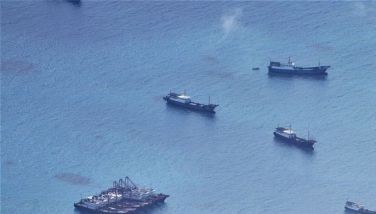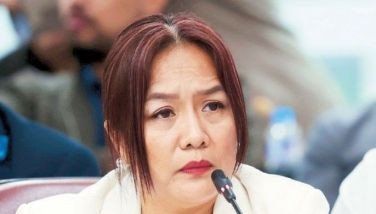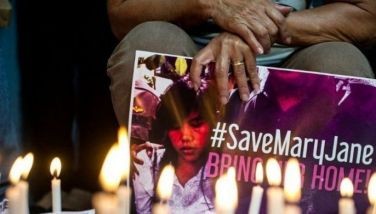Duterte: 2016 Philippines-US Balikatan to be the last
HANOI – President Duterte on Wednesday declared an end to joint military exercises with US forces, saying the upcoming scheduled war games would be the “last one.”
“I am serving notice now to the Americans. I will maintain military alliance because of RP-US pact which our country signed in the early 1950s,” Duterte said.
Duterte said during a two-day visit to Vietnam that he wants to establish new trade and commercial alliances with China and Russia, and that the war games were something Beijing does not want.
“And I will serve notice that this will be the last military exercise,” Duterte declared before the Filipino community at the Grand Ballroom of Intercontinental Hotel here.
Duterte added the Philippines would not participate in joint patrols in the South China Sea “with gray ships.”
“Anyway, I have this ruling of the international arbitration court which says that the South China Sea, the entitlements there are ours,” he said.
The UN-backed Permanent Court of Arbitration in July ruled that China has no historic rights to resources within the South China Sea areas falling within their nine-dash line claim.
China reacted furiously, saying it “neither accepts or recognizes” the ruling.
“Our conflict with China is not really... is more of an imaginary thing. What I mean to say is, we cannot go to war (with China) just because there is that award,” he said.
Duterte reiterated he will not abandon the arbitration ruling with regard to China but stressed Manila cannot win if it launches a war with Beijing even with the help of Washington.
“Either we go to war or we talk. We cannot prevail over China. I am telling you, even with the help of America,” he said.
Duterte stressed he does not want to join patrols with the US in the South China Sea amid the maritime dispute with China.
“There will never be an occasion that I will send a gray ship there. Not because I am afraid,” he said.
Duterte also told the gathering of a supposed plan of the US Central Intelligence Agency (CIA) to assassinate him.
He appealed to the CIA to allow him to get used to being president first.
Duterte has had an uneasy relationship with the US since he won a presidential election in May. He said he is charting a foreign policy not dependent on the US, and has taken steps to revive ties with China, which had been strained under his predecessor over longstanding territorial conflicts in the South China Sea.
Earlier this month, Duterte said he would not allow government forces to conduct joint patrols in disputed waters near the South China Sea with foreign powers, apparently scrapping a deal his predecessor reached with the US military earlier this year.
Duterte has said he wanted the US military forces out of Mindanao and blamed America for inflaming local Muslim insurgencies there.
Duterte has said he was considering acquiring military equipment from Russia and China.
Difficult foreign policy direction
Foreign Affairs Secretary Perfecto Yasay Jr. explained Duterte does not want the Philippines to have joint control with any country in the South China Sea outside of the country’s territorial jurisdiction.
“There will be no joint military patrol in the area as if we want to protect our entitlements there because our entitlements there are not territorial but simply our right under the UNCLOS to exploit both living and non-living resources,” Yasay said, referring to the United Nations Convention on the Law of the Sea.
“You have to understand the President’s statement in the context of what he was saying. He was talking about the arbitral tribunal. He was talking about our EEZ,” Yasay said.
Yasay said the “gray ships” that Duterte was referring to are war ships, not necessarily of the US, but from other countries.
Yasay, however, would not comment on the scheduled joint military exercises with the US.
His predecessor, former foreign affairs secretary Albert del Rosario, described Duterte’s foreign policy direction as “unfortunate.”
Del Rosario said the Duterte administration’s foreign policy could “alienate its major economic partners” and create “an unwelcoming environment to foreign investors.”
Malacañang said the Philippines is undergoing a “difficult” shift towards an independent foreign policy that would positively affect its wellbeing and prosperity.
Presidential spokesman Ernesto Abella said the Philippines should be allowed to chart its own course and fulfill its destiny on its own terms.
“There is a shift that’s happening. So it is not unfortunate but it is part of a process, difficult as it may be, but it is part of a process which the President sees is setting our own independent chart, our own independent course,” Abella said.
“It may be difficult and it may be challenging, but definitely the President sees it as something that will actually add to our wellbeing and prosperity as a nation,” he added.
Abella reacted to the statements of Del Rosario.
“He (Del Rosario) is welcome to his own perception. However, we need to bring into consideration the particular policy that the President is bringing us into. In a sense, he’s really bringing a shift in the direction,” Abella said.
Abella said the public should “see the substance” behind Duterte’s style, which involves colorful language and harsh statements.
“As the President says, again and again, and said earlier, look behind my words and see the actual situation on the people and the nation,” Abella said.?“So beyond the style, which is what you termed as harsh, is the substance which is to set the direction of an independent and free Philippines,” he said.
As to the joint military drills with the US, Abella said no timetable has been set. He, however, pointed out Duterte had made clear his intention in his speech in Hanoi on Wednesday.
Last ‘for the year’
National Security Adviser Hermogenes Esperon Jr. also believed the President was referring to the last of the war games “for the year.”
“We have treaties, right? The Mutual Defense Treaty… We have the Enhanced Defense Cooperation Agreement, so that would continue,” he added.
“We are going to some kind of demilitarization in the area,” Esperon said. “What I understand that it’s the last for the year.”
Despite Duterte’s anti-US pronouncements, Abella said the fundamental relationship between Manila and Washington has not changed.
Abella noted Duterte had promised to honor all treaties and pacts during his inaugural address. The joint exercises of the Philippines and the US were in line with the Mutual Defense Treaty forged by the two countries in 1951.
“However, there are also certain modifications in their relationship and so the relationship remains solid according to the agreements, but also there will be other activities that will be more open to other nations too,” Abella said. – Christina Mendez, Alexis Romero, AP
- Latest
- Trending
































